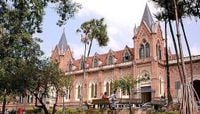In a recent evaluation by Brazil's Ministry of Education (MEC), only six out of 309 medicine courses achieved the highest score of 5 in the Preliminary Course Concept (CPC), a key indicator of higher education quality in the country. This data was released on Friday, April 11, 2025, by the National Institute of Educational Studies and Research Anísio Teixeira (Inep).
The results revealed that the majority of top-performing courses are offered by private, non-profit institutions, particularly traditional colleges located in São Paulo. At these universities, the average monthly tuition fee is approximately R$ 11,200. Among the six highest-rated programs, only one is affiliated with a state public university, highlighting a significant trend in Brazil's medical education landscape.
The CPC assesses various factors, including infrastructure, faculty qualifications, student performance in the National Student Performance Exam (Enade), and the educational resources available to students. This evaluation system serves as a critical regulatory measure for higher education in Brazil.
According to the report, only 40.4% of the evaluated medicine courses received grades of 4 or 5, indicating a concerning trend for the quality of medical education in the country. The data also showed that the majority of courses, about 50.5%, received a grade of 3, which is considered average. In contrast, 38.5% of the programs were rated 4, while a mere 1.9% achieved the coveted maximum score.
The increase in the number of medical courses in recent years can be attributed to several factors, including the Mais Médicos program, which has encouraged the establishment of medical schools in remote areas. This initiative aims to address the shortage of healthcare professionals in underserved regions of Brazil. Furthermore, the financial returns associated with medical education have motivated private institutions to expand their offerings.
Professional associations linked to private higher education have been actively lobbying in Congress and the judiciary to establish criteria for the approval of additional medical schools. They argue that expanding the number of medical programs is essential to meet the growing demand for healthcare services across the nation.
The Inep's evaluation also encompassed other healthcare and engineering programs, including architecture and physiotherapy. The CPC scores range from 1 to 5, with grades of 4 and 5 deemed acceptable for high-quality medical education.
In light of the findings, the MEC has expressed intentions to revise how healthcare courses are evaluated. The goal is to implement a more rigorous assessment of practical training within medical education. This initiative aims to better understand how students learn at different levels of healthcare service delivery, including both primary and specialized care.
Among the six medicine courses that received the maximum CPC score of 5 are:
- Faculdade de Ciências Médicas da Santa Casa de São Paulo (FCMSCSP) – São Paulo (SP) – Monthly fee: R$ 10,998
- Faculdade Israelita de Ciências da Saúde Albert Einstein (FICSAE) – São Paulo (SP) – Monthly fee: R$ 11,910
- Universidade do Oeste Paulista (Unoeste) – Presidente Prudente (SP) – Monthly fee: R$ 11,688
- Faculdade de Medicina de São José do Rio Preto (Famerp) – São José do Rio Preto (SP) – State
- Centro Universitário Governador Ozanam Coelho (Unifagoc) – Ubá (MG) – Monthly fee: R$ 10,356.11
- Centro Universitário São Camilo – São Paulo (SP) – Monthly fee: R$ 11,145
In the state of Paraíba, the best-performing medical course was at the Federal University of Paraíba (UFPB), which achieved a score of 4, while all other programs in the region received a score of 3.
The Inep's evaluation process also includes measures for courses that receive low CPC scores. If a program is rated poorly, it will undergo an external evaluation, and if it continues to perform inadequately, the institution may be required to enter into a commitment to address its deficiencies within a year. Failure to improve can result in penalties, including the potential closure of the program.
As Brazil continues to grapple with healthcare challenges, the quality of medical education remains a critical concern. The findings from Inep's evaluation highlight the need for ongoing scrutiny and improvement in the country's medical training programs. With the demand for healthcare professionals on the rise, ensuring that medical education meets high standards is essential for the future of public health in Brazil.









